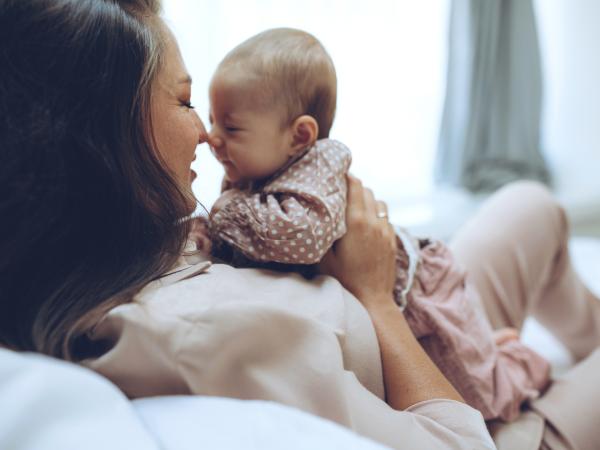
Dr Sophie Brock
Dr Sophie Brock is a Motherhood Studies Sociologist and Mother who offers education on the sociology of motherhood and how our broader society shapes our experience as mothers.

I’ve been reluctant to write about the ‘silver linings’ during this period of isolation. I know the term can seem dismissive of the very real challenges, disappointments and grief being experienced by new mums such as:
I acknowledge it’s hard for new mums, and my heart has been breaking for those struggling at this time. However, challenges often beget benefits, and I think some benefits have come from this situation too.
In many cultures around the world, a new mother won’t leave her home for the first forty days or so after birth. Others come to care for her so she can focus on breastfeeding, resting and recovering from birth. They bring her food, take care of chores and look after her older children. In western societies though, there is a distinct lack of support in the postpartum period, and the thing is, even before the pandemic, this kind of care wasn’t the reality for many new mums. This time is often not revered, and subsequently, most new parents don’t ask for or arrange help, and rarely is it genuinely offered. I really hope this is changing – I believe we’re well overdue for a paradigm shift in how we as a society care for new mothers.
If you had prepared in-home support for your postpartum period and have missed out on it due to COVID-19 restrictions, this will be a massive loss for you. However, for some new mothers there are benefits to the ‘no visitor’ rule brought in, particularly those who were expecting ‘visitors’ rather than ‘helpers’. While visitors can be great company and break up the monotony of being alone all day with a baby, they can also bring challenges.
I know things look very different for those with older children, but for first-time mums, this period of isolation could potentially mean more time for rest.
I was flooded with visitors for the first month or so after my first child was born. I’m a social person, so in many ways, I loved the company. But it also became draining having the same conversations and answering the same questions over and over again, particularly as I was so tired most of the time.
Many visitors arrive with a gift, stay for a chat and leave again.
This is precisely what I used to do when visiting friends with new babies. Then I had my own children and discovered how much support we need in those early weeks and months after a baby is born. I’m hopeful that one day a visit to a new mum will automatically mean food is brought and practical and emotional support is provided during the visit.
With hindsight and knowledge about the importance of rest in the postpartum period, I can’t say I would miss having some of my visitors if I had a baby during this pandemic. Having helpers visit is another thing altogether – those who bring food, hold your baby while you nap or shower, hang out the washing, sweep the floor and bring you cups of tea and cake – and missing out on this practical support is a big deal.
During my first postpartum period, sometimes the doorbell rang with the next visitor at precisely the time my baby had finally fallen sleep. That precious window of time, where I could also lie down and close my eyes – gone. In the absence of visitors right now, new mums can potentially rest whenever their baby lets them, and with no visitors, there are no expectations about having the house clean and tidy for them!
Now I realise I shouldn’t have worried, but I do remember missing out on much-needed rest in the scramble to clean the house up before visitors arrived.
For mums trying to establish breastfeeding, having no visitors means they can focus all their attention on that, without having to entertain guests.
Gone are the distractions of conversations while trying to attach your baby to the breast, feeling the need to cover up for visitors or delaying feeds when you’re out and about. When you’re home all day without distractions, you can follow your baby’s lead at all times by feeding on demand, and this improves breastfeeding rates overall. I vividly remember how painful and awkward breastfeeding was for the first six weeks and how much I would try to avoid it while visitors, (especially those who I wasn’t comfortable being topless around) were there. Some visitors can also bring a whole lot of unsolicited advice with them. As well-meaning as it may be, this is often a source of great stress for new mums trying to find their way.
Some new mums have recently told me how nice it has been for them and their babies to get to know each other and find their rhythm without the barrage of conflicting advice coming from every which direction.
Without visitors, there’s no feeling of being ‘observed’. Even though advice usually comes from a place of love, it can become confusing, making it harder to follow your intuition when you’ve got all the ‘shoulds’ in your head from well-meaning family, friends and even some health professionals.
Another bonus for some new mums is the help from a partner working from home who otherwise would have been out at work all day. For some, this means getting little breaks from the baby, having lunch made for them, or just having an extra pair of hands in a ‘poo-nami’ emergency.
I know there is an awful lot that new mums have missed out on because their postpartum period has occurred during a pandemic – I do not, in any way, wish to dismiss these experiences. I’ve been supporting new mums with these struggles every day. Many difficult feelings have arisen, such as disappointment, deep sadness and anger. Increased rates of postnatal depression and anxiety due to social isolation is a reality and services such as PANDA have reported a significant increase in call numbers.
Every new mum will have experienced COVID-19 differently, and there are multiple factors at play here. I’ve spoken to many new mums over the last few months. For most, there have been both pros and cons. I would love to hear from you – have there been any other ‘silver linings’ in your experience of being a new mum during COVID-19 that I haven’t mentioned here?

Dr Sophie Brock is a Motherhood Studies Sociologist and Mother who offers education on the sociology of motherhood and how our broader society shapes our experience as mothers.

Louise’s vision of a world where everyone is safe, free, and accepted to be their authentic self guides her powerful, yet gentle and compassionate coaching style.

Sarah Prime loves helping new business establish their online presence – whether it’s building a new website or revamping an existing one, she’s here to help.

In this workshop Meg will explore four of the main principles of regenerative business and experiment with applying them to our businesses.
I respectfully acknowledge the Gunaikurnai People who are the traditional owners of the land on which I live and work. I recognise their continued connection to Country and Community. I pay my respects to Elders past and present. I extend that same respect to all Aboriginal and Torres Strait Islander people. It always was, is and will be Aboriginal land.
Subscribe * and I’ll send you my guide on ‘10 Ways to Build Your Village’, which also includes prompts to help you break down some of those barriers you might have to asking for help.
* By entering your email address you agree to subscribe to my mailing list (from which you can unsubscribe at any time).